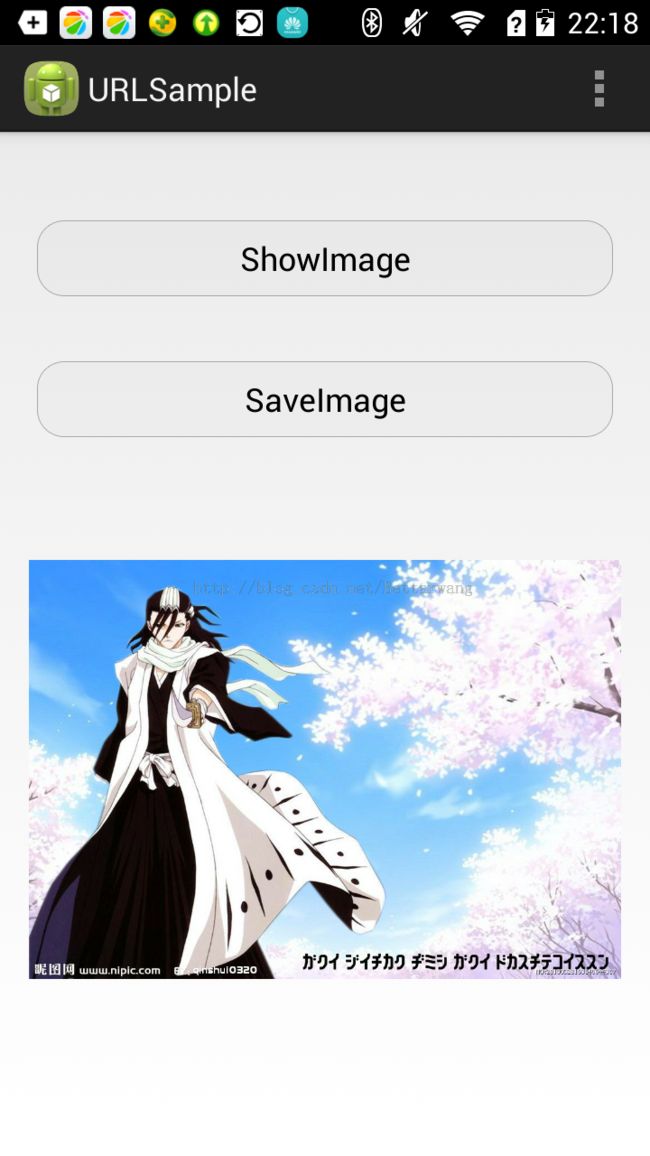Android中的网络编程系列(一):URLConnection
转载请注明出处:http://blog.csdn.net/bettarwang/article/details/41229955
URL(Uniform Resource Locator)对象代表统一资源定位器,它是指向互联网资源的指针。URL由协议名、主机、端口和资源路径组件,即满足如下格式:
protocol://host:port/path
例如http://kan.sogou.com/dianying/就是一个URL地址。
URL提供了多个构造方法用于创建URL对象,同时它提供的主要方法如下:(1)String getFile():获取此URL的资源名;
(2)String getHost():获取此URL的主机名;
(3)String getPath():获取此URL的路径部分;
(4)String getProtocol():获取此URL的协议名称;
(5)String getQuery():获取此URL的查询字符串部分;
(6)URLConnection openConnection():返回一个URLConnection对象,它表示URL所引用的远程对象与本进程的连接;
(7)InputStream openStream():打开与此URL的连接,并返回一个用于读取该URL资源的InputStream;
下面以下载Baidu上的一张死神的图片为例,示范如何使用URL:
layout文件很简单,就两个button和一个ImageView,就不贴上来了,下面是源码:
public class MainActivity extends Activity implements View.OnClickListener{
private static final String PIC_URL="http://pic7.nipic.com/20100528/4981527_163140644317_2.jpg";
private static final int SHOW_IMAGE=0x123;
private static final int SAVE_SUCC=0x124;
private static final int SAVE_ERROR=0x125;
Button showImageButton,saveImageButton;
ImageView imageView;
Bitmap bitmap;
private Handler handler=new Handler()
{
@Override
public void handleMessage(Message msg)
{
if(msg.what==SHOW_IMAGE)
{
imageView.setImageBitmap(bitmap);
}
else if(msg.what==SAVE_SUCC)
{
Toast.makeText(getBaseContext(), "图片保存成功", Toast.LENGTH_LONG).show();
}
else if(msg.what==SAVE_ERROR)
{
Toast.makeText(getBaseContext(), "图片保存出错", Toast.LENGTH_LONG).show();
}
}
};
private void initView()
{
showImageButton=(Button)findViewById(R.id.showImageButton);
saveImageButton=(Button)findViewById(R.id.saveImageButton);
imageView=(ImageView)findViewById(R.id.imageView);
}
@Override
protected void onCreate(Bundle savedInstanceState) {
super.onCreate(savedInstanceState);
setContentView(R.layout.activity_main);
initView();
showImageButton.setOnClickListener(this);
saveImageButton.setOnClickListener(this);
}
@Override
public boolean onCreateOptionsMenu(Menu menu) {
// Inflate the menu; this adds items to the action bar if it is present.
getMenuInflater().inflate(R.menu.main, menu);
return true;
}
private void showImage()
{
new Thread()
{
@Override
public void run()
{
try
{
URL url = new URL(PIC_URL);
InputStream is=url.openStream();
bitmap=BitmapFactory.decodeStream(is);
handler.sendEmptyMessage(SHOW_IMAGE);
is.close();
}
catch(Exception e)
{
// TODO Auto-generated catch block
e.printStackTrace();
}
}
}.start();
}
public void saveImage()
{
new Thread()
{
@Override
public void run()
{
try
{
URL url=new URL(PIC_URL);
InputStream is=url.openStream();
BufferedInputStream bis=new BufferedInputStream(is);
String filePath="animation.png";
FileOutputStream fos=getBaseContext().openFileOutput(filePath,MODE_PRIVATE);
BufferedOutputStream bos=new BufferedOutputStream(fos);
byte[]buff=new byte[32];
int hasRead=0;
while((hasRead=bis.read(buff))>0)
{
bos.write(buff,0,hasRead);
}
bos.close();
fos.close();
bis.close();
is.close();
handler.sendEmptyMessage(SAVE_SUCC);
}
catch(Exception ex)
{
handler.sendEmptyMessage(SAVE_ERROR);
ex.printStackTrace();
}
}
}.start();
}
@Override
public void onClick(View v) {
// TODO Auto-generated method stub
switch(v.getId())
{
case R.id.showImageButton:
showImage();
break;
case R.id.saveImageButton:
saveImage();
break;
}
}
}

保存的图片则可以data/data/com.android.urlsample/files下看到,要注意的一个细节就是关闭流的顺序是与创建的顺序相反,否则会抛出异常。